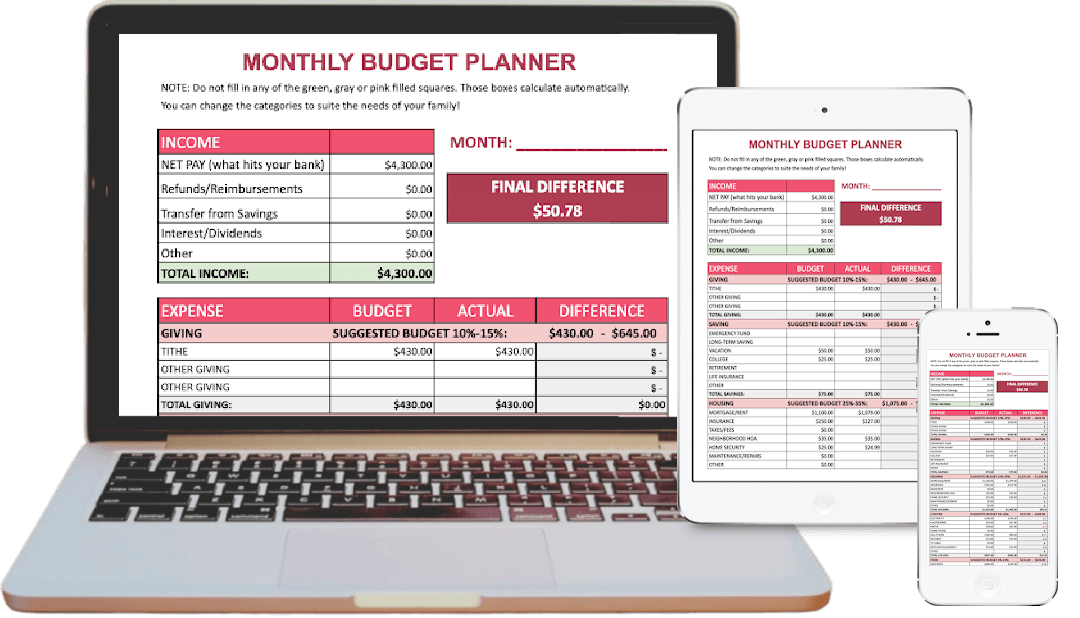Budgeting can be tricky, especially in the beginning. Persistence, planning, and determination are the keys to overcoming budget challenges.
Here are some budgeting challenges that you may face and how to overcome them:

1. Not Knowing Where to Start
Trying to figure out how to budget your money can feel like a daunting task, especially if you don’t know where to start. Fortunately, there are a lot of great resources out there that can help you get started. You can find budget templates, spreadsheets (like my free budgeting spreadsheet here), and books online or in stores.
Some of the budgeting techniques are:
- Zero Based Budget
- Reverse Budget
- 50-30-20 Budget
The most important thing is just to get started. Or, you can talk to a financial planner or coach about your specific situation and get help creating a budget. Once you have a budget in place, it’ll be easier to manage your finances and save money.

2. Struggling to Stick to the Budget
Putting your finances in order can be a challenge, primarily if you’re used to spending freely. But if you find yourself struggling to stick to your budget, there are a few things you can do.
First, make sure your budget is realistic for your lifestyle and income. If it’s too restrictive, you’re more likely to break it.
Second, find a budget buddy who can help you stay accountable and on track.
Finally, give yourself some breathing room and grace – allow yourself flexibility in your budget so you’re not constantly stressed about sticking to it.

3. Unplanned Expenses
Unexpected expenses are always a challenge when it comes to budgeting. Being prepared is the best way to deal with these challenges. Sometimes these things aren’t even emergencies. Such as a birthday party for a classroom friend of your child.
Have a little money saved up for spontaneous unplanned spending or know where to cut back if you need to.
A few other real-life examples are when your friend from high school pops into town and wants to go to dinner. Or your mother-in-law is in a nursing home rehabilitation center and needs different pants and tops that are easier to get on and off.
By being prepared, you can avoid the stress of dealing with unexpected expenses. And remember, even if you have to make some cuts in your budget, you can always find other ways to save money to make up for it later.

4. Overspending on Fixed Expenses
Fixed expenses are a fact of life, but that doesn’t mean you have to overspend. There are plenty of ways to cut costs without sacrificing quality or convenience.
One way to deal with this is to find cheaper alternatives.
If your phone bill is too high, look into alternative providers or plans. If you’re paying for cable TV, see if you can get by with a less expensive package or stream content online. And if you’re paying for a gym membership that you never use, cancel it and find free or low-cost workout options in your area.
By getting creative and doing some research, you can probably find ways to reduce your fixed expenses without too much hassle.

5. Not Budgeting for Fun
Anyone who has ever tried to stick to a budget knows that it can be challenging. There are so many expenses to account for, and it can be tempting to skimp on the fun to save money.
However, research shows that this is a counterproductive approach.
So, it’s vital to include fun money in your budget. Doing so will help you stay on track and avoid feeling like you’re sacrificing your social life for saving a few dollars.
Plus, when you have money set aside for fun, you’ll be able to enjoy it.
BONUS FREE DOWNLOAD

Create A Plan For Your Money
These FREE Budgeting Spreadsheets will help you keep a pulse on your money (from the palm of your hand).
5. Not Budgeting for Fun
Anyone who has ever tried to stick to a budget knows that it can be challenging. There are so many expenses to account for, and it can be tempting to skimp on the fun to save money.
However, research shows that this is a counterproductive approach.
So, it’s vital to include fun money in your budget. Doing so will help you stay on track and avoid feeling like you’re sacrificing your social life for saving a few dollars.
Plus, when you have money set aside for fun, you’ll be able to enjoy it.
6. Not Knowing Where Your Money is Going
If you’re feeling overwhelmed by your finances, you’re not alone. Many people find it challenging to stay on top of spending, resulting in not knowing where their money is.
The good news is that there is a simple solution to this problem: track your spending for one month.
Tracking will help you save money, but it’ll also give you peace of mind. Tracking your spending will give you a clear picture of your financial habits, and you’ll be able to identify areas where you can cut back.
And then, if you want to dive deeper into the numbers, you can figure out what percent of your money should go to bills.
Some apps can do this for you (if you don’t mind connecting your banking information), or you can do it with paper and pencil.
It can be a long and tedious task if you’re doing it manually, but you need to have this information. Your financial life will be better for it.

7. Not Having Financial Goals
Not having financial goals is another budgeting challenge. Without specific goals, it’s hard to know why you’re working so hard.
Try sitting down and writing out your financial goals – both short-term and long-term. Writing out your goals will help you stay on track and motivated.
Some examples of financial goals might be:
- Paying off credit cards
- Having an emergency fund of 3-6 months of expenses
- Saving $10,000 for your daughter’s wedding
- Going on vacation and having it paid for before you leave
- Retiring earlier than the norm

8. Getting Your Spouse and Family on Board
It’s hard to make changes if you’re the only one trying. You’ll be able to make changes easier if you sit down and discuss them with your loved ones. Agree on what is reasonable and necessary, then work together to make it happen.
Money is one of the most significant sources of stress in a relationship. If you and your spouse are not on the same page financially, it can strain your marriage.
It’s essential to have an honest conversation about money with your spouse. Talking about money can be a difficult conversation, but it’s necessary if you want to get on the same page financially.
Talk about your financial goals and how you can work together to reach them. Be open and honest about your financial concerns.
Listen to your spouse’s thoughts and feelings about money. Work together to develop a plan that will work for both of you.
Having this kind of conversation can be difficult, but it’s essential if you want to strengthen your marriage and build a solid financial future together.

9. Planning for Emergencies
It’s essential to have a plan for emergencies. An unexpected expense can throw your budget off track and cause stress if you’re not prepared.
One way to prepare for emergencies is to create a budget cushion. A cushion is some money that you set aside specifically for unexpected expenses.
You can use this money to cover the cost when something comes up.
Another way to prepare for emergencies is to have a savings account specifically for your rainy day fund. Adding to it automatically every paycheck will keep you from thinking about it.
Building an emergency fund can be a challenging goal to achieve, but it’s worth it in the long run. When you have money saved up for emergencies, you’ll avoid having to put unnecessary stress on your budget.

10. Eating Out and Not Meal Planning
Restaurant meals can quickly add up, especially if you’re dining out multiple times a week. If you’re trying to stick to a budget, one of the best ways to save money is to cook at home more often.
Consider eating leftovers, writing down all your family’s favorite dinners, or packing easy lunches for work to save money.
Meal planning and preparing your food can help you save a significant amount of money, and it’s also a great way to eat healthier. When you control what goes into your meals, you can choose delicious, frugal, and nutritious recipes.
There are several different ways to meal plan. You can use a planner, an app, or even just a piece of paper. Decide what works best for you and stick to it.
Check out this free meal planning tool kit for more help.
It’s also important to budget for food costs. When you know how much you’re going to spend on food each week, you’ll be less likely to overspend.

11. Holiday Planning
One of the biggest budget challenges comes during the holidays. It’s easy to get carried away and spend more than you intended.
One way to avoid overspending is to plan. Start budgeting for the holidays early on, so you have plenty of time to save up. Set a budget for each category, such as gifts, food, and decorations.
Another way to save money during the holidays is to be creative. Instead of buying expensive gifts, think about alternative ideas that won’t break the bank. You can make your presents, go Christmas caroling, or have a potluck dinner with friends and family.
The key is to be proactive and plan. If you budget wisely and stay within your budget, you’ll be able to enjoy the holidays without going into debt.

12. Finding the Best Budget for You
There is no one-size-fits-all budget. What works for one person may not work for another.
It’s essential to find a budget that fits your lifestyle and personality. If you hate tracking expenses, a detailed budget may not suit you. Instead, you may want to try a more simple budgeting method.
On the other hand, if you love detail and organization, a more detailed budget may work well for you.
Experiment with different budgeting methods until you find one that feels comfortable and works for you.
There’s also the question of how you want to budget. Do you like spreadsheets, apps, or simple paper and pencil? Want to get yourself a cash envelope wallet and try cash only?
It comes down to personal preference.
BONUS FREE DOWNLOAD

Create A Plan For Your Money
These FREE Budgeting Spreadsheets will help you keep a pulse on your money (from the palm of your hand).

13. Borrowing Money
Borrowing money can be a tempting way to make ends meet when struggling financially. However, it’s important to remember that borrowing should always be a last resort.
Any type of debt can be a big budgeting challenge, but it’s worth it to avoid the high-interest rates and fees associated with borrowing money. You can do a few things to stay afloat financially without borrowing.
First, try to create a budget and stick to it. Creating a budget will help you better handle your expenses and income.
Second, try to cut back on unnecessary costs. Cutting back on spending may require some lifestyle changes, but it will be worth it in the long run.
Finally, try to boost your income by finding ways to earn extra money. These may include taking on extra work, starting a side hustle, or selling unwanted items online.

14. Being Unorganized
Being disorganized is one of the biggest budgeting challenges. It can lead to a lot of wasted money and missed opportunities.
The best way to overcome this challenge is to develop a system that works for you.
A system may include creating folders on your computer for budget-related documents or using an app to track your expenses.
It’s also important to be specific with your budget. If you’re unsure where to start, try creating an allotment for one month and then adapting it based on your results.
Being unorganized can also lead to missed payments and late fees. To avoid this, set up reminders on your phone or computer to help you stay on top of your bills. You can also sign up for automatic payments, so you never forget a payment.
The key is to find a system that works for you and be consistent with it. Budgeting becomes much more manageable when you’re organized.

15. Not Budgeting Enough Money
One of the most common budgeting challenges is not budgeting enough money. Not budgeting enough money can lead to financial problems down the road.
When creating a budget, it’s essential to be realistic. Don’t budget for more money than you have, as it will only set you up for failure. Instead, try to budget for what you need and want and be willing to make sacrifices if needed.
It’s also important to remember that budgeting is a process. It may take some time to get it right, but it’s worth it. When you have a budget in place, you’ll be able to manage your money better and reach your financial goals.
Final Thoughts on The Most Common Budgeting Challenges
Not everyone has a budget. The times we are living in are demanding that we do. 80% of Americans now have a budget.
With a bit of effort, budgeting can be easy and even enjoyable.
You can do a few things to make budgeting more accessible, including finding a budget that fits your lifestyle and personality, being specific with your budget, and setting up reminders to help you stay on track.

More Fun Articles To Read:
How To Fill Your Emergency Savings Fund In Just 2 Months
Whether you're trying to pay off debt or just getting your financial life in order, we all need an emergency savings fund or a rainy day fund. Emergency funds are so essential for our financial security. When a financial crisis and unexpected expenses occur, instead...
The 4 Different Types Of Budgeting You Need To Try
Did you know there are different types of budgeting? There is. And since there is no right or wrong answer when it comes to how you budget your money, neither is one type of budgeting. Some methods may work better for you than others, but as long as you are sticking...




